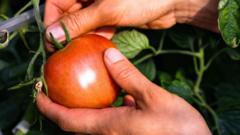A BBC-led investigation found that numerous 'Italian' tomato purees sold in UK supermarkets are likely made with tomatoes sourced from China's Xinjiang region, where forced labor allegations persist.
**UK Supermarkets' 'Italian' Tomato Purees Linked to Chinese Forced Labor**

**UK Supermarkets' 'Italian' Tomato Purees Linked to Chinese Forced Labor**
Investigation reveals that several popular tomato purees may contain tomatoes from regions known for forced labor practices.
In a concerning revelation, a report has surfaced suggesting that tomato purees marketed as “Italian” in several UK supermarkets could indeed contain tomatoes sourced from China, specifically from the Xinjiang region, which is notorious for its association with forced labor. This report, compiled by the BBC and backed by scientific analysis, sheds light on the shocking connections between popular supermarket products and human rights abuses in China.
Products sold under major British retailers such as Tesco, Asda, Waitrose, and others were tested, revealing that 17 different puree products contained tomatoes likely sourced from Chinese farms. The Xinjiang region, known for its ideal tomato-growing conditions, has been under scrutiny for the alleged forced labor of Uyghur Muslims and other ethnic minorities who reportedly endure severe working conditions, including extreme quotas and physical abuse.
Despite the findings, the supermarkets involved have disputed the allegations, claiming their internal investigations found no evidence of Chinese tomatoes in their products. Tesco has taken proactive measures by suspending certain supplies, while other retailers have conducted their tests asserting that the results contradicted the BBC's.
The BBC’s investigation involved tracing tomatoes from China through complex supply chains, focusing particularly on a company named Antonio Petti, which appeared prominently in shipping data for tomato products entering Europe. The firm reportedly received millions of kilos of tomato paste from companies linked to forced labor.
Undercutting claims of ethical sourcing, the investigation found troubling evidence when placing an undercover reporter within the Petti Group, leading to a confrontation that revealed knowledge about the use of Chinese tomatoes.
With the U.S. enacting stringent regulations against forced labor imports, criticisms arise about the UK's lagging approach to supply chain ethics, with concerns that it may become a destination for products tied to forced labor circumstances. Experts highlight the need for legislation that ensures fair labor practices and encourages consumers to question the true cost behind low-priced products.
As discussions unfold about the role of supermarkets in this troubling situation, substantial calls for greater transparency and ethical responsibility resonate, pushing consumers and retailers alike to confront the darker reality of food sourcing.
Products sold under major British retailers such as Tesco, Asda, Waitrose, and others were tested, revealing that 17 different puree products contained tomatoes likely sourced from Chinese farms. The Xinjiang region, known for its ideal tomato-growing conditions, has been under scrutiny for the alleged forced labor of Uyghur Muslims and other ethnic minorities who reportedly endure severe working conditions, including extreme quotas and physical abuse.
Despite the findings, the supermarkets involved have disputed the allegations, claiming their internal investigations found no evidence of Chinese tomatoes in their products. Tesco has taken proactive measures by suspending certain supplies, while other retailers have conducted their tests asserting that the results contradicted the BBC's.
The BBC’s investigation involved tracing tomatoes from China through complex supply chains, focusing particularly on a company named Antonio Petti, which appeared prominently in shipping data for tomato products entering Europe. The firm reportedly received millions of kilos of tomato paste from companies linked to forced labor.
Undercutting claims of ethical sourcing, the investigation found troubling evidence when placing an undercover reporter within the Petti Group, leading to a confrontation that revealed knowledge about the use of Chinese tomatoes.
With the U.S. enacting stringent regulations against forced labor imports, criticisms arise about the UK's lagging approach to supply chain ethics, with concerns that it may become a destination for products tied to forced labor circumstances. Experts highlight the need for legislation that ensures fair labor practices and encourages consumers to question the true cost behind low-priced products.
As discussions unfold about the role of supermarkets in this troubling situation, substantial calls for greater transparency and ethical responsibility resonate, pushing consumers and retailers alike to confront the darker reality of food sourcing.


















